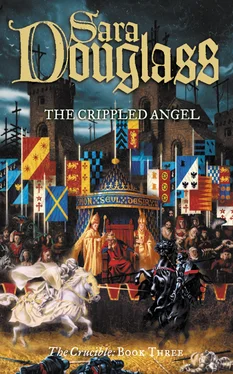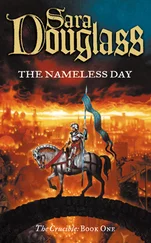Harry nodded, and darted away towards the stairs.
“William, what is going on ?”
“Pestilence,” William said, staring about wildly as if looking for something else to shutter closed.
Margery drew in a deep breath. “But we haven’t suffered from the pestilence in—”
“How long it has been doesn’t matter,” William said, and directed his middle son into the front rooms of the house to shutter the windows. “What matters is that the pestilence is back now . Have you opened the door to anyone this day? Any beggars, anyone who has touched you?”
Margery stared at him, then very slowly looked down at her apron. Wordlessly she tore it off, then bundled it into the coals in the hearth.
It was too late. By evening one of the apprentices, the cook, two of Margery’s sons, and William himself were fighting raging fevers. Huge swellings appeared in their armpits, at the bases of their necks, and in their groins.
They were tight and agonising, filled almost to bursting point with black blood and pus.
Margery did what she could—and she was left on her own to do it, because the two still-healthy servants had fled the house at the first signs of sickness—but that was little enough. She moved from bed to bed, wiping faces and hands with cloths wrung out in cool, herbed water. When her youngest son and one of the apprentices began to soil themselves with great clotting black messes, she changed their linens, her heart almost failing at their screams of agony as she rolled them over.
In the dark of early morning, as she was trying to change the linens under the apprentice, three of his buboes burst, and he bled to death, screaming, in under ten minutes.
And the nightmare had only just begun.
By dawn, William was dead, drowned in the mass of blood and pus that had collected in his lungs. The child and the apprentice who had so far escaped were tossing with fever, and Margery, in emptying out a bucket of blood and pus-stained rags into the courtyard refuse heap, suddenly realised that her arms were aching, and difficult to move.
There were hard lumps in both of her armpits.
Margery stood there for long minutes, the bucket at her feet, staring sightlessly at the refuse heap before her.
She moved her arms, very slightly, and again felt the painful swellings in her armpits.
Margery began to weep, great sobbing gulps, full of exhaustion and terror. She remembered how only a day ago her life had been so good, how the future shone so bright, how she and William had done so well for themselves from such humble beginnings.
Now?
Now it was all gone. Gone in less than a day.
Margery slowly sank to the cold cobbles, lay down, and waited to die, staring up at the grey sky with her weeping eyes.
Much later, dogs began to feed on her almost dead body.
III Tuesday 21st May 1381 —iii—
Bolingbroke stretched tired neck and shoulder muscles, and looked one more time at the plans and documents that Dick Whittington had spread on the table. He lifted a candle—even though dawn light now shone through the windows, it was still not strong—and peered more closely at the plan of London spread before him.
He and the Lord Mayor, as also Bolingbroke’s Chancellor, the Bishop of London, and several other clerks and secretaries, stood in one of the upper chambers of the Tower of London Keep. Most of the palace was still undergoing renovation, but at least this chamber was finished, and warmed by a fire roaring in the grate.
Someone—Bolingbroke had forgotten who—had thrown rosemary and rue on the fire, and now the sweet scent of the herbs infused the chamber.
Bolingbroke didn’t think the herbs would have much effect in keeping the pestilence at bay.
The door to the chamber opened, and a man dressed in the livery of the Grocers’ Company hurried in. He bowed perfunctorily to Bolingbroke, then whispered in Whittington’s ear before hurriedly quitting the chamber.
“Well?” Bolingbroke said.
“Over a hundred and twenty more deaths,” Whittington said, his shoulders slumping. “Sire, the pestilence has now touched most parts of London.”
Bolingbroke nodded. “That black Dog has done its work well.”
Several of the men in the room exchanged glances, their eyes filled with superstitious fear. Reports of the Dog of Pestilence had come in all night, appearing first here, then there, then somewhere else. No one could catch it, for whenever a band of men closed about it, the Dog merely seemed to vanish into the night air.
“A hound from hell,” the Bishop of London whispered, and crossed himself.
“Not from hell,” Bolingbroke said, sending the bishop a sharp glance, “but from heaven. This is God’s retributive work.”
“God’s work it may be,” Whittington said, forcing a brisk, businesslike tone into his voice, “but it will be man’s work to deal with it. Unless,” he gave the bishop an enquiring look, “the bishop knows some prayers that will drive the pestilence from among us?”
There was a silence. Then the bishop folded his hands before his corpulent belly, looked down, and muttered: “Prayers will be said in churches, of course, but if this is God’s work, then it is His way of punishing sinners and there is little that we—”
“Don’t tell me that this pestilence is God’s means of carrying off sinners,” Bolingbroke snapped. “The innocent are dying as readily as anyone else. Besides, if this pestilence was meant to carry away only the sinners amongst us… then why are most of London’s damned priests and friars still alive?”
There was a twitter of laughter, quickly subdued, and the bishop flushed.
Bolingbroke stared at the bishop a moment longer, then turned back to Whittington. “Well? What can we do?”
“We can do some things to make life safer for those still well,” Whittington said. “Already I have sent orders to set up pest houses here,” his finger stabbed at the map, “and here, and here.”
“Good,” Bolingbroke said. “They are well beyond the city walls. But should people be moving their infected through the streets?”
Whittington shook his head. “The pest houses will be used for people travelling into London, or those trying to leave, to isolate them until we are sure they are not infected. For those families already suffering within the city walls… well, men are even now moving through the streets, hanging bundles of straw from the windows of infected houses, and daubing their front doors with red paint.”
Bolingbroke flinched. “Cursed by a daub of red paint and a bundle of straw.”
“No one is allowed to leave or enter those houses,” Whittington continued. “Not even to deliver food.”
“Then pray this pestilence passes quickly,” one of the clerks muttered, “or else people will starve within their homes.”
“What else?” said Bolingbroke. He waved towards the fire. “Should we… ?”
“Already done,” Whittington said. “Great bonfires salted with brimstone and saltpetre have been set up in all major intersections. With sweet Jesu’s aid they will burn the pestilence from the air. Anyone who has to walk the streets, and they are precious few—the watch, those carting away the dead, and physicians and their apprentices—have been given nosegays of herbs and waxed cloaks to help the pestilence slide away from their persons.”
None of which will protect them against God’s black hound , thought Bolingbroke, but he did not speak his thoughts, for it was better to give people hope that something useful was being done, than to dash such hope away.
“All stray dogs are being killed,” Whittington said. “Cats as well. Perhaps they contribute to the spread of the pestilence.”
Читать дальше












